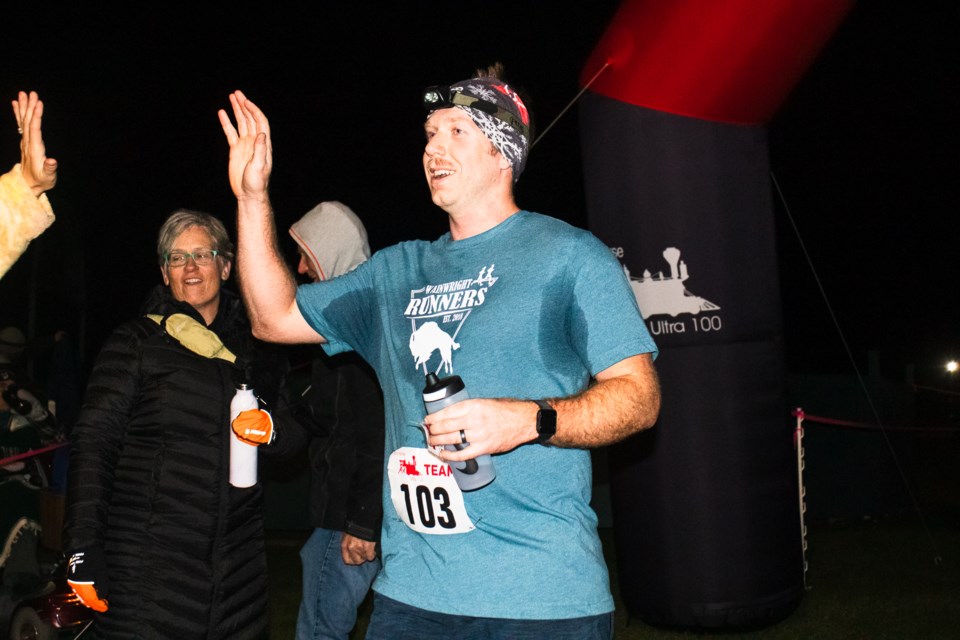ST. PAUL – They say an ultra-marathon is as much a mental battle as a physical one, and last weekend's Iron Horse Ultra 100 in St. Paul put that theory to the test.
Runners from across the province faced not only the distance but also their own limits, and for many, crossing that finish line felt like conquering an impossible mountain.
“It’s a mental game to keep yourself motivated, keep yourself going, while the finish line seems farther and farther, and the lights of the town seem so far away,” says David Madole, a 100-km solo runner.
Fellow 100-km solo runners Vera Koster and Mackenzie Brown from Lloydminster agreed.
The biggest challenge during the race “was not quitting,” said Brown. During the race, there are aid stations set up, and runners can choose to quit at these stations.
And quitting can be tempting, according to Brown. To keep on going, “even though it’s colder out and you’re getting more tired is probably the hardest part,” he said.
Koster nodded, adding, “And continuing to run when everything hurts, and the finish line still seems so far away . . . to keep pushing despite the pain.”
But the three runners completed their race. Madole completed his in 16 hours and 27 minutes, while Koster and Brown completed theirs three minutes after Madole.
And the three share a similar sentiment after finishing the race.
“Amazing,” said Brown.
Allison Sawka was similarly also a 100-km solo runner. Sawka currently lives in Saskatchewan, but her hometown is St. Paul.
Like many of the other racers, Sawka has prior experiences with running. She completed the 100-km last year, as well.
And this year, she wanted to beat her time.
Mentally, Sawka has proven herself strong, but the mind can still be a challenge for her at times, particularly when she was close to the finish line when the pavement was harder.
“Having to deal with that . . . I just kind of shut out the pain,” she said. “I was like, ‘I’m so close . . . I’ll just push through.’”
And push through she did. She completed her race in 16 hours and 49 minutes - beating her previous time.
Redemption
Daylan Wizniuk from Camrose also wanted to beat his time. He wanted “redemption.”
He has been running the Ultra since 2016 and is currently the record holder for both the fastest 100-kilometres and 100-mile runs.
But last year, he was unable to finish. “I dropped out at about 115 [kilometre],” he said. “I just wasn’t feeling well.” 100 miles is equivalent to 160.9 kilometres.
And not being able to complete his run has been on the back of his mind for the past year.
“So, I wanted to come back and get redemption.”
The weather, however, proved to be daunting this year. Normally in the past, weather remains consistent throughout the day - not too cold or too hot.
But this year, “It was cold early,” he said. “You kind of get used to that three degrees,” added Wizniuk. So, when the sun came out half an hour later, even if it wasn’t too hot, “It was still too much.”
“I was running shirtless for probably four hours,” he said. “It was just a different challenge that I haven’t had here before.”
But he completed his race in 17 hours and 28 minutes – breaking his previous record by 13 minutes.
Asked why he keeps coming back, Wizniuk said it “intrigues me” how much farther and faster he can go. It intrigues him how much he can push beyond his limit. “That’s, I’d say, is why I keep doing it.”
But next year, Wizniuk said he hopes to take it easier and do the newly added 60-kilometre category in the Elk Point area.
60-km
The 60-km run is a new addition to the Iron Horse Ultra weekend this year, according to Monique Poulin, the race coordinator for the Ultra.
The new 60 km version is aimed at runners who want to try out a marathon but who aren’t sure if they are up to completing a 100-mile or 100-kilometer race.
It lacks many of the challenging areas faced on the 100-mile and 100-km versions, but still offers breathtaking scenery and an opportunity to see new vistas that are not reached by any roads.
About 50 racers registered for the 60 km race this year, which was organized out of Elk Point.
But overall, including the 100 km and 100 mile solos and team relays, about 200 runners ran this year.
Poulin thanked all the runners who participated this year. “Runners tell us that they’re coming back to St. Paul because of St. Paul, and not just because of this race.”
She expressed gratitude to all the volunteers who helped out. “There’s a ton of volunteer work that goes into this, especially during the weekends.”
“So, we appreciate that and all the community support,” she said.
Looking forward, Poulin says she will be retiring as the race coordinator in 2026.
“I’ve been doing this for 15 years,” said Poulin. “Sometimes, when you’ve done something for a really long time, it just becomes a little bit stagnant.”
She said she wants the Iron Horse Ultra to always be a great event for the sake of the runners and everyone who keeps supporting it. “This event needs to grow and change,” she said.
But Poulin promises to always come back and volunteer in the future.
She also invites those wanting to check out the event to come and sign up next year - that includes an invitation to Iron Horse Ultra’s annual general meeting in January.
“You can come and talk to us at any time – learn about what we do for the running community, as well as how you can help and join us and make this an even better event.”



